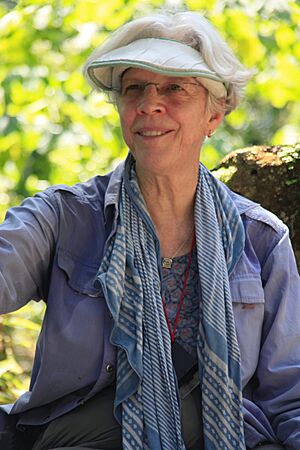Anabel Ford facts for kids
Quick facts for kids
Anabel Ford
|
|
|---|---|

Ford in 2023
|
|
| Born | 22 December 1951 (age 74) |
| Alma mater | University of California, Santa Barbara |
| Known for | Discovery of El Pilar, Maya civilization archaeology |
| Scientific career | |
| Fields | Anthropology Archaeology |
Anabel Ford, born on December 22, 1951, is an American archaeologist. She studies ancient cultures in Mesoamerica, especially the Maya civilization in Belize and Guatemala. She is famous for finding the ancient Maya city called El Pilar. Today, Dr. Ford works at the University of California, Santa Barbara. She is part of the Institute of Social Behavioral and Economic Research (ISBER). She also leads the MesoAmerican Research Center (MARC) there.
Contents
Early Life and Education
Anabel Ford was the oldest of three children. All of them were born in Los Angeles County, California. Her father, Joseph B. Ford, was a sociology professor. He knew many languages, including German, Italian, French, Spanish, and Japanese. He could also read and write in Latin. Anabel Ford's mother, Marjorie Henshaw, was an actress. She was also known by her stage name, Anabel Shaw.
Dr. Ford became interested in ancient Mesoamerican places. These included Teotihuacan, Monte Albán, and Chichen Itza. This interest led her to study Maya sites hidden in the jungle. In 1981, she earned her PhD from the University of California, Santa Barbara. Her research focused on a survey between the Maya cities of Tikal and Yaxha. These cities are in the Petén Basin of Guatemala. She started her career as a research scientist at UCSB. In 1986, she became the director of the Mesoamerican Research Center.
Discovering Ancient Maya Cities
Dr. Ford began her work in the Maya lowlands in 1972. In 1978, while working on her doctorate, she mapped a path. This path connected the Maya cities of Tikal and Yaxhá. Both cities are in the Petén Basin of northern Guatemala.
In 1983, Dr. Ford started a project called BRASS. This stands for the Belize River Archaeological Settlement Survey. The project aimed to understand how Maya people lived and used their environment. During this survey, she and her team found the ancient Maya city of El Pilar. In the years that followed, the BRASS team dug up many sites. These sites were hidden under the thick forest canopy.
From 1983 to 1989, Dr. Ford's team studied the homes and living areas around El Pilar. From 1990 to 1992, they focused on digging up these homes in more detail. Research at El Pilar starting in 1993 created detailed maps. It also helped create a timeline for the ancient monuments. El Pilar is now a protected area in Belize and Guatemala. It is planned to become a "peace park." Current research focuses on mapping the residential parts of El Pilar. The team also looks for new, undiscovered sites and monuments. Since 2013, the team has used Lidar technology. This technology uses lasers to map the ground. National Geographic funded this work. Lidar helped them find The Citadel. This is a temple complex on a hilltop.
Protecting Maya Heritage
As Dr. Ford worked in the Maya region, she learned a lot from local people. She developed a plan called Archaeology Under the Canopy. This plan helps protect forests. By saving the forest, we also save cultural heritage. The forest around El Pilar protects the ancient monuments. It also protects artifacts made by the city's old residents. So, keeping the forest safe helps protect the region's history. Her efforts helped protect almost 2,000 hectares in the El Pilar area.
Dr. Ford's work at El Pilar is featured in a book. The book is called The Modern Maya Incidents of Travel and Friendship in Yucatan. It was written by Macduff Everton. This book shows how important it is to understand Maya history. This understanding helps protect the Maya Forest. Dr. Ford and Everton have worked together. They have given presentations and published articles. These works show the value of traditional Maya knowledge.
Dr. Ford also works with Ronald Nigh. He studies how people interact with their environment. Their book is called The Maya Forest Garden: Eight Millennia of Sustainable Cultivation of the Tropical Woodlands. This book looks at old and new farming methods. It argues that ancient Maya farming techniques are still useful today. These methods can support many people for a long time. They believe traditional Maya practices can help solve modern problems. These problems include climate change and running out of natural resources.
Current Work and Recognition
Dr. Ford is the president of Exploring Solutions Past: the Maya Forest Alliance. This is a nonprofit organization. It works to show the world how important Maya culture is. Dr. Ford believes that traditional Maya practices can help solve today's problems. These include climate change and a lack of natural resources. Exploring Solutions Past: Maya Forest Alliance works with Maya farmers. They support sustainable agriculture in the region.
In 2000, she received an award from the Rolex Awards for Enterprise. This award recognized her work in cultural heritage. As of 2013, Dr. Ford is also a board member of the Duke of Edinburgh Awards.
Images for kids
See also
 In Spanish: Anabel Ford para niños
In Spanish: Anabel Ford para niños
 | Aaron Henry |
 | T. R. M. Howard |
 | Jesse Jackson |


